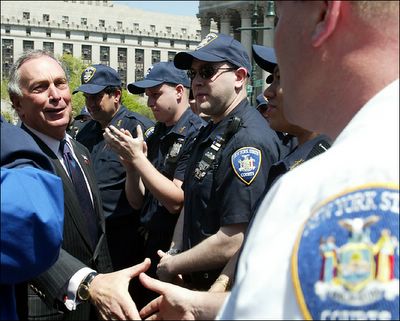Wednesday, May 11, 2005

Ruby Washington/The New York Times
Mayor Michael R. Bloomberg won the endorsement of the New York State Court Officers Association yesterday in his bid for re-election
May 11, 2005
Bloomberg Says Fire Chief Must Support Emergency Plan or Leave
By MIKE McINTIRE
Mayor Michael R. Bloomberg made clear yesterday that he would not tolerate continued disagreement over his new emergency response protocol, saying that the fire chief who publicly criticized it needs to support the new guidelines - or leave.
In careful but pointed remarks, the mayor said he was not angry with Chief Peter E. Hayden, who testified on Monday that he thought the protocol was flawed. But, the mayor said, he expected everyone in his administration to back the new procedures.
"My job is not to be angry; my job is to make sure that everybody works together," Mr. Bloomberg said. "There are always going to be differences of opinion. But everybody, in the end, if they want to work for the city, is going to get together and work together and follow the decisions that the mayor was elected to make. I expect that to be the case here."
Later, in response to another question about Chief Hayden, Mr. Bloomberg added: "Look, we are going to have everybody working together to protect the people of the City of New York. And anybody that doesn't feel that they can do that doesn't have to - but they just can't work here."
The not-so-veiled threat reflected what Mr. Bloomberg's aides say is his determination to enforce his decision on the protocol, which was made after lengthy deliberations involving the heads of many city agencies, including the Fire Department. Chief Hayden made his disagreement with the decision publicly known first in a newspaper interview, and then in this week's testimony, after he was subpoenaed to appear before the City Council. The chief said he believes that the new policy gives the police too much control at some emergency scenes.
Yesterday, the chief and the fire commissioner, Nicholas Scoppetta, presided over a promotions ceremony for firefighters, where they were asked by reporters about Chief Hayden's future. Mr. Scoppetta said he had received no pressure from City Hall to get rid of Chief Hayden, the city's highest-ranking fire officer, who serves at the pleasure of the mayor until June of next year, when his probationary period ends.
"No, absolutely not. We have not had that conversation, and I don't feel any pressure to do that," he said. "I think that Pete has made his position clear, both on what the objections were, and now that the document is final, we're going to make it work."
If the chief were forced out, he could either retire or accept a demotion in civil service rank to assistant chief, the position he held before being named chief last year. Chief Hayden said he had "no intention of leaving."
"Certainly, I serve at the pleasure of the mayor, but I think that I put forth a valid argument, and I hope he takes that into consideration moving forward," he said. "We will certainly work within the department to comply" with the new protocol, he added.
"We'll follow the document as it's written, and we will make sure that everybody follows it in the field," Chief Hayden said. "If there are inconsistencies or conflicts in the document that necessitate being addressed as we move forward, we'll bring that to the attention of the Office of Emergency Management."
The chief's main objection was the mayor's decision to place the Police Department in immediate command of hazardous materials emergencies until it is determined if terrorism or criminal activity is involved. Doing so, he argued, "makes no sense" because firefighters are expected to conduct rescue operations at such emergencies, yet would be subjugated to the police, whose investigative mission may conflict with the fire crews' role.
Yesterday, taking questions after an economic development announcement at Kennedy Airport, Mr. Bloomberg said he had decided that police and fire commanders would jointly supervise all emergency scenes except those involving hazardous materials, "based on F.B.I. and C.I.A. intelligence that the most likely terrorist attack would be a haz-mat attack on us."
"I've heard everybody's views, and you can't have a solution that is going to satisfy everybody," the mayor said, adding later: "We've made the decision. And now everybody is going to get on board and make that decision work."
Copyright 2005 The New York Times Company Home Privacy Policy Search Corrections RSS Help Contact Us Back to Top
